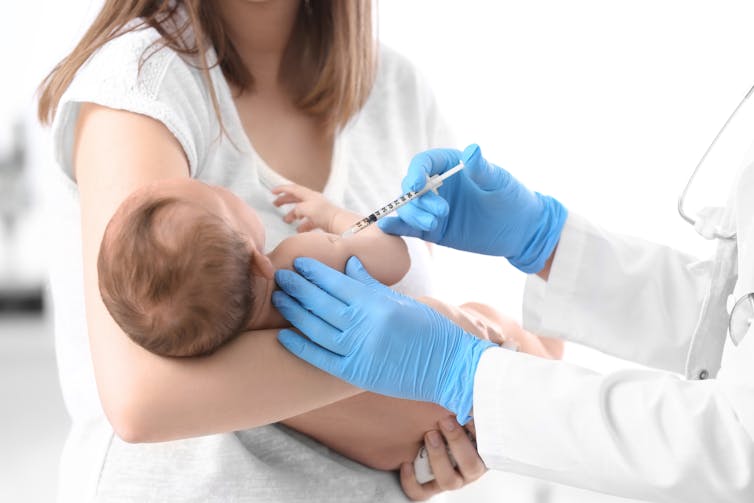A large outbreak of pertussis (more commonly known as whooping cough) has been ongoing in the UK since the beginning of 2024. There have been 2,793 confirmed cases so far this year. Sadly, five infant deaths due to whooping cough have been confirmed, with unconfirmed reports that a sixth infant may have died in the last week of the bacterial infection.
This is a stark reminder that whooping cough is a very nasty infection. While the symptoms are usually mild in healthy older children and adults, it can be lethal for babies.
Globally, there are an estimated 24 million cases of whooping cough each year and around 160,000 deaths.
Whooping cough is caused by a bacteria called Bordetella pertussis. Pertussis often begins like most other respiratory infections, with typical symptoms including a runny nose and a fever. The distinctive “whoop” cough may only appear after a week or so of illness – though it does not occur in all cases. As such, confirming cases of whooping cough may require a laboratory test.
Whooping cough is very infectious. On average, a single case of pertussis can transmit infection on to around 15-17 other people. This infection rate is similar to measles and higher than the COVID variants.
The reason whooping cough is so infectious is in part due to pertussis having a very long infectious period of up to five weeks – where infected people can pass the bacteria on to others. Prompt treatment can greatly reduce transmission – antibiotics shown to reduce contagiousness just five days after starting treatment.
But prior to treatment, there are plenty of opportunities for transmission to occur and for an outbreak to be maintained. Both confirmed and asymptomatic cases can be responsible for onward transmission of whooping cough.
Why have cases spiked?
One slightly curious aspect of whooping cough is that there are big outbreaks typically every few years. The last sizeable outbreak in the UK was in 2016 with almost 6000 confirmed cases. The reasons for these cycles are not fully understood, but a key factor is probably waning immunity at the population level.
The immunity from the pertussis vaccine is initially very protective, but it does decline a few years after the initial vaccination. This is why a consistently high vaccine uptake across the population is vital.
The vaccine is very safe and effective. Vaccinating young children and pregnant women – some of the most vulnerable groups within the population – is particularly crucial for preventing infection and illness.
Children who are fully vaccinated are 84% less likely to get a confirmed whooping cough infection compared to those who weren’t vaccinated. Vaccines not only prevent young children from becoming unwell – vaccines also lower the risk of children transmitting the infection onto young siblings, family members and friends.
Immunisation during pregnancy is also particularly important as the antibodies the mother gets from the vaccine protects the newborn in their first few weeks of life – before the baby is themselves old enough to receive their first pertussis vaccine dose. A dose during pregnancy prevents around 78% of pertussis cases in newborn babies.
But vaccine coverage has dropped in recent years. Maternal vaccine uptake was 70% in 2017, but only 58% in 2023.
The percentage of children vaccinated by their first birthday dropped slightly from around 93% just prior to the pandemic to 92% in 2022-2023. A similar drop (from 85% to 83%) is seen with the booster dose children can have prior to their fifth birthday. This drop in coverage may be contributing to the current outbreak.

The vaccine is very effective at preventing pertussis. Africa Studio/ Shutterstock
While one publication has suggested the outbreak is probably a “surge fuelled by lockdown”, there’s no evidence to support this assertion.
This kind of messaging isn’t helpful as it doesn’t raise awareness or educate the public on the things they can do to prevent the spread of whooping cough. Given that people’s health-related behaviour can be significantly impacted by the news they read, high-profile media sources have a responsibility to report accurate information.
The sheer extent of the pandemic may have affected access to healthcare and vaccination rates, resulting in a drop of the population-wide immunity needed to prevent severe outbreaks. Geographical variations in vaccine uptake might also be a contributing factor – though, at the time of writing, there isn’t any data available on case numbers by UK region.
To control the current outbreak, widespread use of antibiotics to treat or prevent pertussis infections will probably be used. If anyone suspects they have whooping cough, they should speak to their doctor as soon as possible – not only because of the severity of the illness, but because prompt treatment reduces person’s infectious period.
While UK guidance does not routinely recommend a pertussis vaccine in adults, an extra dose is known to be safe and effective. This may be advised for people who have come in close contact with someone who has whooping cough. It may also be important for people who could be vulnerable to a severe infection – such as the elderly.
Ultimately, whooping cough is an infection that can be prevented by vaccines. The grim news of infant fatalities in the UK reminds us all that there are very good reasons why immunisation is recommended. And, in the longer-term, outbreaks can be minimised in both the number of cases and the severity of cases by maintaining a high vaccine coverage.
Access to vaccination, as well as accurate information about the small risks and significant benefits, is going to be key in bringing the outbreak under control.



 Oral retinoids can harm unborn babies. But many women taking them for acne may not be using contraception
Oral retinoids can harm unborn babies. But many women taking them for acne may not be using contraception  How does the drug abemaciclib treat breast cancer?
How does the drug abemaciclib treat breast cancer?  Paris in spring, Bali in winter. How ‘bucket lists’ help cancer patients handle life and death
Paris in spring, Bali in winter. How ‘bucket lists’ help cancer patients handle life and death  Aggressive? Homophobic? Stoic? Here’s what thousands of Australian men told us about modern masculinity
Aggressive? Homophobic? Stoic? Here’s what thousands of Australian men told us about modern masculinity  Cardiac rehab is a proven but underused therapy in women, but tailored resources aim to change that
Cardiac rehab is a proven but underused therapy in women, but tailored resources aim to change that  I’m pregnant. Do I need a multivitamin?
I’m pregnant. Do I need a multivitamin?  How much time should you spend sitting versus standing? New research reveals the perfect mix for optimal health
How much time should you spend sitting versus standing? New research reveals the perfect mix for optimal health  Novavax, Sanofi Ink Deal to Commercialize COVID-19 Vaccine to Jointly Produce Combination Shots
Novavax, Sanofi Ink Deal to Commercialize COVID-19 Vaccine to Jointly Produce Combination Shots  What are heart rate zones, and how can you incorporate them into your exercise routine?
What are heart rate zones, and how can you incorporate them into your exercise routine?  How do I keep my fruit, veggies and herbs fresh longer? Are there any ‘hacks’?
How do I keep my fruit, veggies and herbs fresh longer? Are there any ‘hacks’?  Noise-cancelling headphones, earplugs and earmuffs – do they really help neurodivergent people?
Noise-cancelling headphones, earplugs and earmuffs – do they really help neurodivergent people?  Navel gazing: checking your belly button can tell you a lot about your health
Navel gazing: checking your belly button can tell you a lot about your health  Does ‘whining’ really make you happier? A therapist gives his verdict
Does ‘whining’ really make you happier? A therapist gives his verdict  After 180 years, new clues are revealing just how general anaesthesia works in the brain
After 180 years, new clues are revealing just how general anaesthesia works in the brain  Iron fuels immune cells – and it could make asthma worse
Iron fuels immune cells – and it could make asthma worse  Low testosterone in men associated with an early death – new study
Low testosterone in men associated with an early death – new study 






























